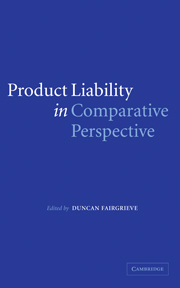Book contents
- Frontmatter
- Contents
- List of figures
- Foreword by Sir Michael Burton
- List of contributors
- Preface
- 1 Introduction
- PART I Country reports
- 2 The use of comparative law in A & Others v National Blood Authority
- 3 Spanish product liability today – adapting to the ‘new’ rules
- 4 Interaction between the European Directive on Product Liability and the former liability regime in Italy
- 5 L'Exception française? The French law of product liability
- 6 German product liability law: between European Directives, American Restatements and common sense
- 7 Dutch case law on the EU Product Liability Directive
- 8 Defect in English law – lessons for the harmonisation of European product liability
- PART II European influences
- PART III Comparing systems
- Appendix
- Index
2 - The use of comparative law in A & Others v National Blood Authority
from PART I - Country reports
Published online by Cambridge University Press: 28 July 2009
- Frontmatter
- Contents
- List of figures
- Foreword by Sir Michael Burton
- List of contributors
- Preface
- 1 Introduction
- PART I Country reports
- 2 The use of comparative law in A & Others v National Blood Authority
- 3 Spanish product liability today – adapting to the ‘new’ rules
- 4 Interaction between the European Directive on Product Liability and the former liability regime in Italy
- 5 L'Exception française? The French law of product liability
- 6 German product liability law: between European Directives, American Restatements and common sense
- 7 Dutch case law on the EU Product Liability Directive
- 8 Defect in English law – lessons for the harmonisation of European product liability
- PART II European influences
- PART III Comparing systems
- Appendix
- Index
Summary
Introduction
The editor of this publication has invited two of the claimants' advocates instructed in an important case presenting both comparative law and Community law questions to describe how the case came to judicial attention, and the legal and factual challenges presented by arguing broad principle-driven doctrines before an English court during a trial lasting forty-nine court days. We represented 112 individuals who were infected with hepatitis C as a result of blood transfusions in England. This chapter, written with the consent of the claimants' solicitors, is extended with a postscript by counsel for the defendant and completed by an afterword from the trial judge. The claimants were successful, but it was a ‘close-run thing’.
The problem of contaminated blood transfusions is not new to medicine or to litigation, especially in the United States. The United Kingdom avoided the excesses of the United States by having a non-commercial blood-bank system. The claimants had certainly been injured but it was questionable whether they had a good cause of action under conventional negligence principles. It is intrinsically difficult to establish liability on the part of a public authority performing a valuable public service. A case based on negligence would need to demonstrate considerable levels of breach of duty.
- Type
- Chapter
- Information
- Product Liability in Comparative Perspective , pp. 13 - 41Publisher: Cambridge University PressPrint publication year: 2005
- 1
- Cited by



